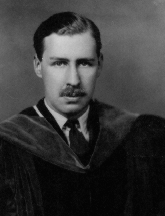A Quote by Tatiana Schlossberg
Nitrogen-based fertilizers, which came into wide use after World War II, helped prompt the agricultural revolution that has allowed the Earth to feed its seven billion people.
Related Quotes
There is another innovation at Harvard which I think made a tremendous difference and that is the decision to try to recruit the very best person in the field for an available faculty position. In the period after World War II Harvard literally engaged in world-wide searches for the very best and created a culture in which it was simply unacceptable to hire friends and associates, to make decisions based on personal affections or inclinations.
A recent review of different agricultural options for the future was conducted by a panel of experts. The scientists posed the question: How are we going to feed the world when there are nine billion people on it, as there will be by 2050? And the answer they came up with was industrial agriculture won't work and genetic engineering won't work and the solution is going to be sustainable, and going to ecological kinds of farming that are based on local environmental conditions that work with local ecosystems available to develop a richer kind of farming technology.
It's important to remember that World War II was experienced very much as a continuity in that sense. Most of World War II in most of Europe wasn't a war; it was an occupation. The war was at the beginning and the end, except in Germany and the Soviet Union, and even there really only at the end. So the rest of time it's an occupation, which in some ways was experienced as an extension of the interwar period. World War II was simply an extreme form, in a whole new key, of the disruption of normal life that began in 1914.
It's very important to understand that World War II is at the base of this new policy. From the 1890s on, the U.S. was always imperialistic. We went after the Philippines, and we did the same in Cuba, in Hawaii. We controlled South America. Woodrow Wilson was not what he was supposed to be. He was very much a white man first. "The world must be made safe for democracy." It really accelerates after World War II.
I think in many ways, the Spanish Civil War was the first battle of World War II. After all, where else in the world at this point did you have Americans in uniform who were being bombed by Nazi planes four years before the U.S. entered World War II? Hitler and Mussolini jumped in on the side of Francisco Franco and his Spanish nationalists, sent them vast amounts of military aid, airplanes, tanks - and Mussolini sent 80,000 ground troops as well - because they wanted a sympathetic ally in power. So I think it really was the opening act of World War II.
































